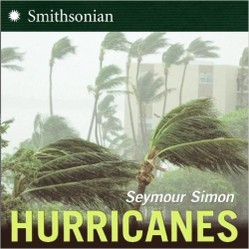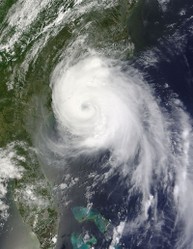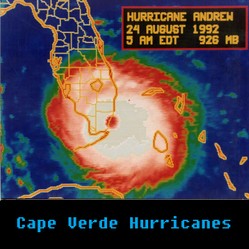Hurricanes are huge heat engines. Something has to start the system. Often this involves the Intertropical Convergence Zone, the area near the equator where the air from the two hemispheres collides and rises. This area acts like a front, and low pressure systems can form where the line of convergence buckles. The global air circulation has air moving towards the Intertropical Convergence Zone from the east, and angling in from the two hemispheres. If the Intertropical Convergence Zone is far enough away from the equator, and it does drift north during the northern hemisphere’s summer and south during the winter, the Earth’s rotation will cause the easterlies to change to a westerly direction, having air pass each other as it moves into the Intertropical Convergence Zone. The collision of the air from the two hemisphere causes the air to rise, and triggers severe thunderstorms.
Inro Image: Allowed by the Amazon affiliate program. The book is shown below.









 Multivariable Calculus: Gradient, Divergence, and Curlon 12/19/2025
Multivariable Calculus: Gradient, Divergence, and Curlon 12/19/2025
 UAPs, Formerly UFOs, If They Are Real How Can We Explain Their Arrival to Earth?on 12/18/2025
UAPs, Formerly UFOs, If They Are Real How Can We Explain Their Arrival to Earth?on 12/18/2025
 Polar Coordinate Systemon 12/16/2025
Polar Coordinate Systemon 12/16/2025
 Aurora Can Disrupt Electrical Devices And Even the Grid?on 12/15/2025
Aurora Can Disrupt Electrical Devices And Even the Grid?on 12/15/2025



Comments
Thank you for your comment below, in answer to my previous observation and question.
Olivia McClure authored the article Turn your yard's low spot into a high point with a rain garden for LSU AgCenter of Baton Rouge June 20, 2025. She asks whether or not "amendments such as sugarcane bagasse, expanded shale and wood chips can enhance the functions of rain gardens."
She counts, per LSU AgCenter Hammond Research Station Landscape Horticulture Assistant Professor Damon Abdi, as rain garden-able such plants as:
American beautyberry (Callicarpa americana)
Dwarf palmetto (Sabal minor)
Hardy hibiscus/rose mallow (Hibiscus moscheutos)
Louisiana iris (Iris brevicaulis/fulva/giganticaerulea/hexagona/nelsonii)
River birch (Betula nigra)
Rush (Juncus tenuis)
Sweetbay magnolia (Magnolia virginica)
Switchgrass (Panicum virgatum)
Virginia sweetspire (Itea virginica)
Yaupon holly (Ilex vomitoria).
Might the above-mentioned non-woody and woody plants make it through hurricane events?
There are fortified roofs and wind mitigation, but flooding is a concern. For larger hurricanes evacuations, even reversing the flow of traffic on some highway lanes, if the best defense.
Derechos and hurricanes and tornadoes, oh my!
Do the Gulf states such as Louisiana defer to certain building materials and to certain indoor/outdoor plants as respectively more defensive of their occupants, owners and users and more functionally, ornamentally survivalistic for their admirers, caregivers and owners?
Fantastic article . Incidentally , if others is requiring to merge some PDF files , my colleagues found a tool here http://www.altomerge.com/.
The NW of England hit about 12 C today. Some sun would be nice for August 1st. :)
I learned a lot about hurricanes today...drank a whole cup of tea while reading! Your knowledge on the subject is apparent. Thanks for sharing.
We hit 100 degrees yesterday, so some snow would be nice right now. But that seems extreme.
We now have the phrase Blizzicane in New England. It's basically a winter hurricane. I was on Cape Cod two years ago when we had 70 mph sustained winds and 95 mph gusts. The whole while it was throwing snow instead of rain. It was a very scary storm.
Thanks to both of you for the comments.
You and I, Veronica, live in broadly the same region, North West England. Here we rarely see a hurricane. When one hits Britain its track seems to be up the English Channel, coming ashore over the mid South and then tracking North over London, losing power as it goes. In the 1987 Hurricane we in the North West got the side of it, with a night of strong winds, but no real damage. The one exception to this was when a strong storm just below hurricane force came from the North Atlantic, and it caused some damage in our region, about twelve years ago.